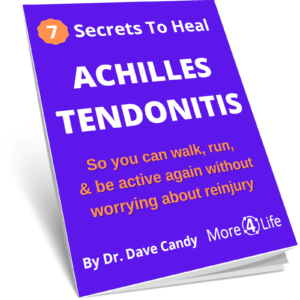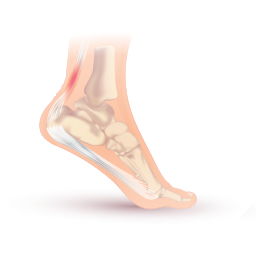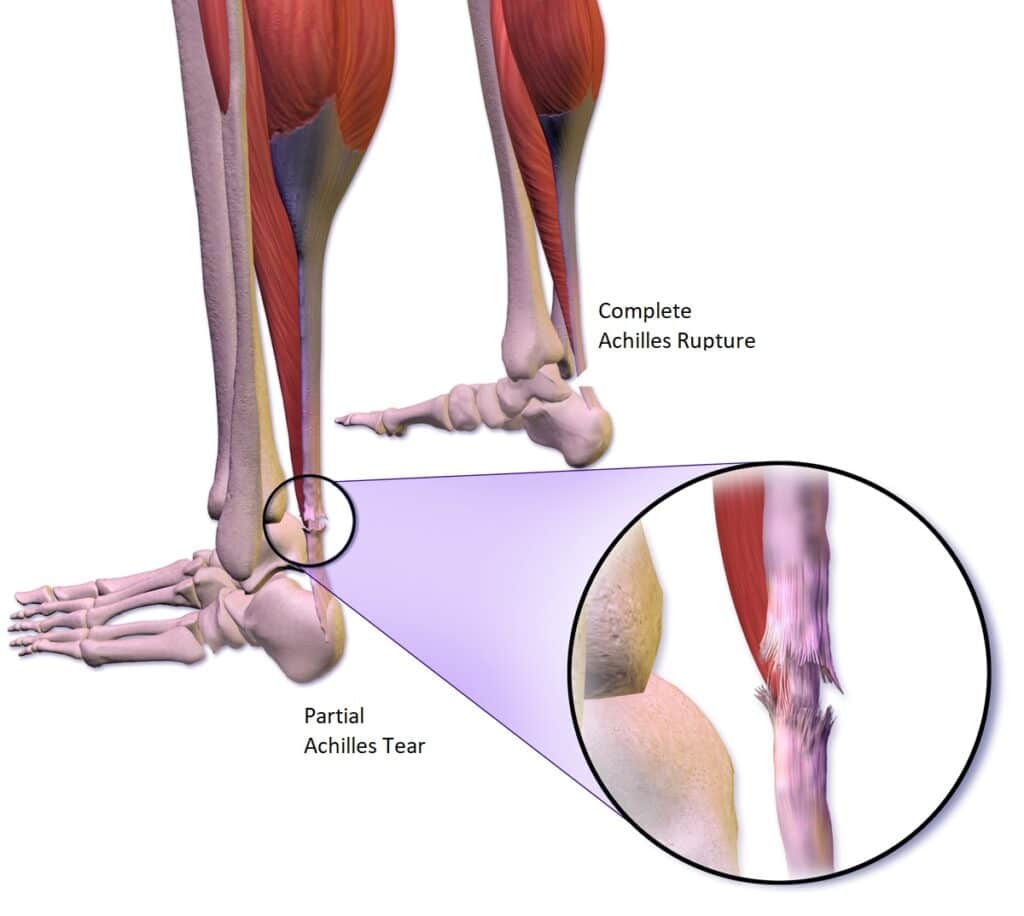If you've noticed a sudden, sharp pain in your calf or Achilles tendon, you might be worried that it's an Achilles tendon rupture. How do you tell the difference between Achilles tendonitis vs Achilles tear vs rupture? That's the question I'll be answering in this post:
What Makes Achilles Tendonitis Rupture?
Watch the video to learn the causes, symptoms, treatment, & recovery time for Achilles tendon ruptures, both with and without surgery.
Achilles Tendonitis vs Achilles Tear vs Rupture
Achilles tendonitis - inflammation of the Achilles tendon
Achilles Tear - a partial tear of the Achilles tendon, but it's still intact
Achilles Rupture - the Achilles tendon is torn completely resulting in a massive loss of function
It's very easy to tell the difference between an Achilles tendonitis and an Achilles rupture. However, an Achilles tear can sometimes be a little difficult to differentiate.
What Causes Achilles Tendonitis To Rupture?
Most Achilles tendon injuries are caused by the repetitive stress of the tendon, and Achilles tendonitis is no different.
By the time the Achilles tendon ruptures, the tendon has usually already been stressed by poor movement patterns. Sports that requires jumping, running, or quick changes in direction can cause stress on the Achilles tendon.
As a result, these poor movement patterns weaken the Achilles tendon to the point that it only requires a smaller amount of stress to rupture it.
Thus, the event that causes Achilles tendonitis to rupture is usually the “straw that broke the camel’s back” rather than one sudden injury.
The ACTUAL cause of the rupture is usually all of the built up stress leading up to that event.
What Are The Symptoms of Achilles Tendon Rupture?
Achilles tendon ruptures are typically associated with a loud “pop” during the time of the injury.
You may or may not feel pain depending on the severity of the rupture. If you do, you may feel like you've been kicked in the back of the calf. In some cases, the pain may feel as if you've been shot in the back of the calf.
The biggest sign of an Achilles tendon rupture though is a significant weakness in your calf muscle. This may cause an inability to point your foot downwards or push-off when walking.
Do I Need An MRI To Tell The Difference Between Achilles Tendonitis vs Rupture?
You do NOT need an MRI to diagnose an Achilles tendon ruptures.
Subjective history and a physical exam can very accurately detect an Achilles tendon rupture.
Having an MRI for an Achilles tendon rupture only adds unnecessary expense and delays getting proper treatment.
Do I Need An MRI To Tell The Difference Between Achilles Tendonitis vs Partial Achilles Tear?
A partial Achilles tear typically has SOME calf weakness associated with it, but not as bad as an Achilles rupture.
In Achilles tendonitis, the calf muscles are usually strong, but they may be inhibited by pain.
To tell the difference between an Achilles tendonitis vs. a partial Achilles tear for sure, you may need an MRI.
However, SHOULD you have an MRI?
Regardless of if you have Achilles tendonitis or a partial Achilles tendon tear, the treatment is usually very much the same:
- Offload the tendon with a heel lift
- Take a short period of rest from provoking activities
- Gradually return to those provoking activities only as pain allows.
In most cases, you're going to treat Achilles tendonitis and a partial Achilles tendon tear symptomatically. There is no point in having an MRI because it's not going to change the treatment approach regardless of the results.
When Should You Have An Achilles Tendon MRI?
If you're a competitive athlete and you have an upcoming important competition, there may be times when you want to "play through the pain" as long as it's not going to put you at risk.
If you have a partial Achilles tendon tear, playing through pain is probably not a good idea because it might put you at risk for an Achilles tendon rupture.
However, if you have Achilles tendonitis, you may be able to get through an important competition with a heel lift and taping, even though temporarily it might make yours symptoms worse.
If you want to find out if it's safe to play through the pain, this would be the one time when it might be a good idea to have an Achilles tendon MRI.
Otherwise, if time is on your side, treat the tendon conservatively as if it were torn.
Do You Need Surgery For Achilles Tendon Rupture?
The good news is that not all Achilles tendon ruptures require surgery.
Achilles tendon repair surgery is not indicated for non-athletes, non-manual labor workers or for people that have diabetes or peripheral vascular disease.
A growing number of orthopedic surgeons have elected to provide conservative treatment for Achilles tendon ruptures to avoid the risk of surgical complications. Research has shown that conservative Achilles tendon rehabilitation has results in comparable functional results vs operative care in many cases.
Can An Achilles Tendon Rupture Heal Without Surgery?
The main concern regarding conservative treatment is whether healing can occur without direct contact of the ruptured ends of the Achilles tendon.
Luckily, recent research has also shown that direct contact of the ruptured tendon is not necessary for healing.
Achilles Tendon Rupture Recovery Time Without Surgery
Conservative treatment for Achilles tendon rupture focuses on physical therapy that focuses on functional rehabilitation with early mobilization.
This involves placing the ankle/foot in approximately 3-4 weeks of cast immobilization with a non-weight-bearing status immediately after the Achilles tendon rupture.
Then, the ankle/foot is placed in a functional brace and is progressively mobilized and loaded. Loading includes slowly and progressively moving, strengthening, and weight-bearing on the ankle/foot.
Most people can walk normally by 3-4 months and then return to sports at 6-12 months depending on the sport.
Surgery For Achilles Tendon Rupture
There are three broad categories of Achilles tendon rupture repair surgery:
- Open - Large incision in the skin
- Mini-open - Small incision in the skin
- Percutaneous - Arthroscopically through the skin
The type of surgery performed is based on the surgeon’s preference/skill, degrees of the tear, and the tissue quality of the tendon.
Any surgery will have risk of complications, but the overall complication rates are not different between the three methods.
The mini-open repair was developed to minimize the complication risks that the other two methods have, such as wound infection during an open repair and nerve injury during percutaneous repair.
Achilles Tendon Rupture Recovery Time After Surgery
Early physical therapy and early weight-bearing allow for improved outcomes following an Achilles tendon surgery.
Prolonged immobilization is not recommended following an Achilles tendon surgery
- Immobilization in a splint or cast should not be greater than 3 weeks.
- Full weight-bearing with a brace should be started within the first 3 weeks after surgery and should be worn up to 6-8 weeks after surgery.
- The focus of rehabilitation is preventing the re-rupture of the tendon during the first 2 months post-surgery. At 2-3 months after surgery, the focus of rehab shifts to increasing calf strength
- You can typically walk normally within 12-18 weeks after surgery and starting functional rehabilitation.
- You should not run or participate in sporting activities until 16-20 weeks after injury.
*Disclaimer: Specific timeframes and protocols vary by surgeon
Achilles Tendon Rupture Brace
While you're immobilized following an Achilles tendon rupture, you may need to wear a walking boot for a few weeks.
Additionally, you'll want to wear a heel lift inside of your walking boot to take pressure off of the Achilles tendon.
It's also a good idea to wear an EVENup Shoe Balancer outside the OTHER shoe so that you don't walk around with one leg artificially longer than the other.
After you're done with your walking boot, you'll definitely need physical therapy to get your ankle moving again after being still for serveral weeks, as well as to strengthen the muscles around your ankle.

Need Physical Therapy For Your Achilles Tendon Problem?
Click the button below to request an appointment







